冀教版小学英语六年级
- 格式:ppt
- 大小:2.92 MB
- 文档页数:47
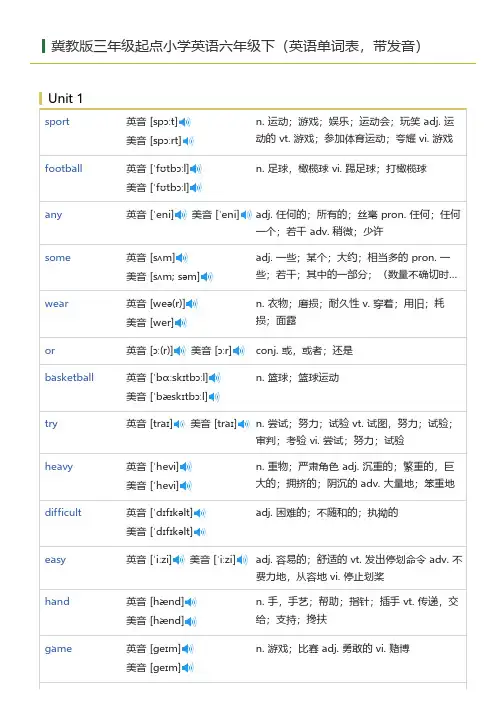
冀教版三年级起点小学英语六年级下(英语单词表,带发音)Unit 1sport英音 [spɔːt]美音 [spɔːrt]n. 运动;游戏;娱乐;运动会;玩笑 adj. 运动的 vt. 游戏;参加体育运动;夸耀 vi. 游戏football英音 [ˈfʊtbɔːl]美音 [ˈfʊtbɔːl]n. 足球,橄榄球 vi. 踢足球;打橄榄球any英音 [ˈeni]美音 [ˈeni]adj. 任何的;所有的;丝毫 pron. 任何;任何一个;若干 adv. 稍微;少许some英音 [sʌm]美音 [sʌm; səm]adj. 一些;某个;大约;相当多的 pron. 一些;若干;其中的一部分;(数量不确切时…wear英音 [weə(r)]美音 [wer]n. 衣物;磨损;耐久性 v. 穿着;用旧;耗损;面露or英音 [ɔː(r)]美音 [ɔːr]conj. 或,或者;还是basketball英音 [ˈbɑːskɪtbɔːl]美音 [ˈbæskɪtbɔːl]n. 篮球;篮球运动try英音 [tra ɪ]美音 [traɪ]n. 尝试;努力;试验 vt. 试图,努力;试验;审判;考验 vi. 尝试;努力;试验heavy英音 [ˈhevi]美音 [ˈhevi]n. 重物;严肃角色 adj. 沉重的;繁重的,巨大的;拥挤的;阴沉的 adv. 大量地;笨重地difficult英音 [ˈdɪfɪkəlt]美音 [ˈdɪfɪk əlt]adj. 困难的;不随和的;执拗的easy英音 [ˈi ːzi]美音 [ˈi ːzi]adj. 容易的;舒适的 vt. 发出停划命令 adv. 不费力地,从容地 vi. 停止划桨hand 英音 [hænd]美音 [hænd]n. 手,手艺;帮助;指针;插手 vt. 传递,交给;支持;搀扶game英音 [ɡeɪm]美音 [ɡe ɪm]n. 游戏;比赛 adj. 勇敢的 vi. 赌博Unit 2ask 英音 [ɑːsk]美音 [æsk]vt. 问,询问;要求;需要;邀请;讨价 vi.问,询问;要求very 英音 [ˈveri]美音 [ˈveri]adv. 非常,很;完全 adj. 恰好是,正是;甚至;十足的;特有的answer 英音 [ˈɑːns ə(r)]美音 [ˈæns ər]n. 回答;答案;答辩 vt. 回答;符合 vi. 回答;符合policeman 英音 [p əˈli ːsm ən]美音 [p əˈli ːsm ən]n. 警察,警员;[分化] 淀帚(橡皮头玻璃搅棒)healthy英音 [ˈhelθi]美音 [ˈhelθi]adj. 健康的,健全的;有益于健康的strong英音 [str ɒŋ]美音 [str ɔːŋ]adj. 坚强的;强壮的;牢固的;擅长的 adv.强劲地;猛烈地before英音 [b ɪˈf ɔː(r)]美音 [b ɪˈf ɔːr]prep. 在…之前,先于 conj. 在…以前;在…之前 adv. 以前;在前after英音 [ˈɑːft ə(r)]美音 [ˈæft ər]conj. 在……之后 prep. 在……之后 adj. 以后的adv. 后来,以后bad英音 [bæd]美音 [bæd]n. 坏事;坏人 adj. 坏的;严重的;劣质的adv. 很,非常;坏地;邪恶地next英音 [nekst]美音 [nekst]adv. 然后;下次;其次 adj. 下一个的;其次的;贴近的 n. 下一个 prep. 靠近;居于…之后often英音 [ˈɒf(ə)n]美音 [ˈɔːf(ə)n]adv. 常常,时常exercise英音 [ˈeks əsa ɪz]美音 [ˈeks ərsa ɪz]n. 运动;练习;运用;操练;礼拜;典礼 vt.锻炼;练习;使用;使忙碌;使惊恐 vi. 运…minute英音 [ˈm ɪn ɪt]美音 [ˈm ɪn ɪt]n. 分,分钟;片刻,一会儿;备忘录,笔记;会议记录 vt. 将…记录下来 adj. 微小的,详…hour英音 [ˈa ʊə(r)]n. 小时;钟头;课时;…点钟Unit 3 Unit 4美音 [ˈaʊər]high英音 [haɪ]美音 [haɪ]n. 高水平;天空;由麻醉品引起的快感;高压地带 adj. 高的;高级的;崇高的;高音调的…fan 英音 [fæn]美音 [fæn]n. 迷;风扇;爱好者 vt. 煽动;刺激;吹拂 vi.成扇形散开;飘动close英音 [kləʊz]美音 [kloʊz; kloʊs]n. 结束 adj. 紧密的;亲密的;亲近的 vt. 关;结束;使靠近 vi. 关;结束;关闭 adv. 紧密地angry英音 [ˈæŋɡri]美音 [ˈæŋɡri]adj. 生气的;愤怒的;狂暴的;(伤口等)发炎的lake英音 [leɪk]美音 [leɪk]n. 湖;深红色颜料;胭脂红 vt. (使)血球溶解 vi. (使)血球溶解swim英音 [swɪm]美音 [swɪm]n. 游泳;漂浮;眩晕 adj. 游泳时穿戴的 vi. 游泳;漂浮;浸;眩晕 vt. 游过;使浮起swam 英音 [swæm]美音 [swæm]v. 游泳(swim的过去式)ship英音 [ʃɪp]美音 [ʃɪp]n. 船;舰;太空船 vt. 运送,乘船;以船运送vi. 上船;乘船旅行;当船员visit英音 [ˈvɪzɪt]美音 [ˈvɪzɪt]n. 访问;参观;逗留 vt. 访问;参观;视察 vi.访问;暂住;闲谈clever英音 [ˈklevə(r)]美音 [ˈklevər]adj. 聪明的;机灵的;熟练的 [ 比较级cleverer 最高级 cleverest ]find英音 [faɪnd]美音 [faɪnd]n. 发现 vi. 裁决 vt. 查找,找到;发现;认为;感到;获得found英音 [faʊnd]美音 [faʊnd]v. 找到(find的过去分词) vt. 创立,建立;创办get 英音 [ɡet]美音 [ɡet]n. 生殖;幼兽 vi. 成为;变得;到达 vt. 使得获得到变成got英音 [ɡɒt]美音 [ɡɑːt]v. 得到,明白(get的过去式和过去分词)party英音 [ˈpɑːti]美音 [ˈpɑːrti]n. 政党,党派;聚会,派对;当事人 [复数parties] vi. 参加社交聚会 [ 过去式 partied …tell 英音 [tel]美音 [tel]vt. 告诉,说;辨别;吩咐;断定 vi. 讲述;告发,泄密;识别begin英音 [bɪˈɡɪn]美音 [bɪˈɡɪn]vi. 开始;首先 vt. 开始late英音 [leɪt]美音 [leɪt]adj. 晚的;迟的;已故的;最近的 adv. 晚;迟;最近;在晚期early英音 [ˈɜːli]美音 [ˈɜːrli]adj. 早期的;早熟的 adv. 提早;在初期cake英音 [keɪk]美音 [keɪk]n. 蛋糕;块状物;利益总额 vt. 使结块 vi. 结成块状every英音 [ˈevri]美音 [ˈevri]adj. 每一的,每个的;每隔…的all英音 [ɔːl]美音 [ɔːl]n. 全部 adj. 全部的 adv. 全然地;越发 pron.全部good-bye英音 [ˌɡʊd ˈbaɪ]美音 [ɡʊd baɪ]n. 告辞 int. 再见hear英音 [hɪə(r)]美音 [hɪr]vi. 听;听见 vt. 听到,听;听说;审理。
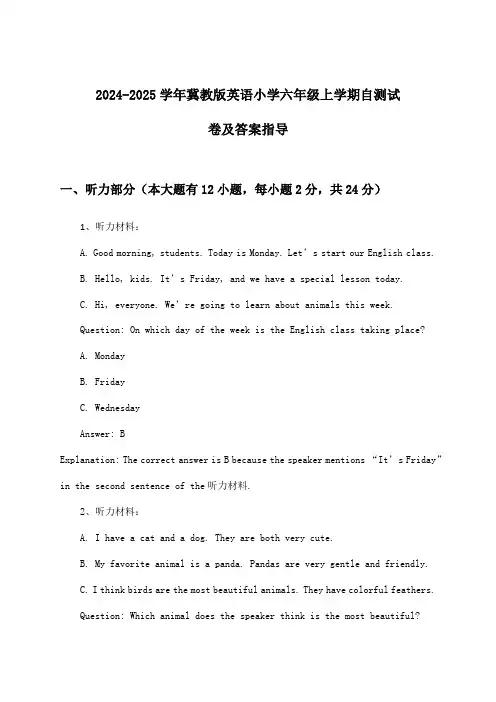
2024-2025学年冀教版英语小学六年级上学期自测试卷及答案指导一、听力部分(本大题有12小题,每小题2分,共24分)1、听力材料:A. Good morning, students. Today is Monday. Let’s start our English class.B. Hello, kids. It’s Friday, and we have a special lesson today.C. Hi, everyone. We’re going to learn about animals this week.Question: On which day of the week is the English class taking place?A. MondayB. FridayC. WednesdayAnswer: BExplanation: The correct answer is B because the speaker mentions “It’s Friday” in the second sentence of the听力材料.2、听力材料:A. I have a cat and a dog. They are both very cute.B. My favorite animal is a panda. Pandas are very gentle and friendly.C. I think birds are the most beautiful animals. They have colorful feathers.Question: Which animal does the speaker think is the most beautiful?A. A catB. A pandaC. A birdAnswer: CExplanation: The correct answer is C because the speaker explicitly states, “I think birds are the most beautiful animals” in the third sentence of the听力材料.3、What does the boy want to do this weekend?A. Visit his grandparentsB. Go to the parkC. Play video gamesAnswer: C. Play video gamesExplanation: In the recording, you will hear the boy say, “I would like to stay at home and play some new video games I g ot.” This indicates that he prefers playing video games over other activities this weekend.4、Where are they going to have their school trip?A. To a museumB. To a farmC. To a science centerAnswer: B. To a farmExplanation: The conversation between the teacher and students mentions, “We’re going to learn about agriculture and see different farm animals.” Thisclearly points out that the destination for the school trip is a farm.5.Listen to the conversation between two students, Tom and Lily, and answer the following question.Question: What are Tom and Lily talking about?A. Their weekend plans.B. The weather.C. Their favorite school subjects.D. The school trip.Answer: CExplanation: In the conversation, Tom asks Lily about her favorite school subject, indicating that they are discussing their academic interests. Therefore, the correct answer is C. Their favorite school subjects.6.Listen to the dialogue between a teacher and a student, Alex, and choose the be st response to the teacher’s question.Question: What did Alex do last night?A. He watched TV.B. He played video games.C. He studied for his math exam.D. He went to the movies.Answer: CExplanation: The teacher asks Alex about his activities from the previous night, and Alex responds by mentioning that he studied for his math exam. Theother options are not mentioned in the dialogue, making C the correct answer.7、What does Sarah want to eat for lunch?A. SandwichesB. PizzaC. SaladAnswer: B. PizzaExplanation: In the dialogue, Sarah mentions that she’s craving something cheesy and round, which hints at pizza being her choice for lunch.8、Where did Tom find his lost wallet?A. At the libraryB. In the parkC. Under his bedAnswer: C. Under his bedExplanation: During the conversation, Tom recounts checking all the places he had been but eventually found his wallet in his room, under the bed, indicating he must have misplaced it there previously.9.听力材料:A. This is my cat. It’s very cute.B. That’s my dog. It’s very smart.C. These are my birds. They are very colorful.Question: What animal does the speaker like most?A. CatB. DogC. BirdsAnswer: CExplanation: The speaker mentions that the birds are very colorful, which indicates that they like birds the most.10.听力材料:A. I like to play soccer with my friends on weekends.B. I enjoy reading books in the park.C. I prefer watching movies at home with my family.Question: What does the speaker like to do in their free time?A. Play soccerB. Read booksC. Watch moviesAnswer: AExplanation: The speaker explicitly states that they like to play soccer with their friends on weekends, making this their preferred activity.11、What is Sarah doing after school?A. Playing soccerB. Going to the libraryC. Watching TVAnswer: B. Going to the library.Explanation: In the dialogue, Sarah mentions that she needs to finish herhomework and is planning to go to the library to study quietly.12、How will Tom get to the park?A. By busB. On footC. By bicycleAnswer: C. By bicycle.Explanation: Tom stated that he loves cycling and would prefer to ride his bike to the park rather than walk or take the bus.二、选择题(本大题有12小题,每小题2分,共24分)1、A. What color is the sky?B. How many apples do you have?C. Who is the tallest in your family?D. When is your birthday?Answer: C. Who is the tallest in your family?Explanation: The question asks for a question that can be answered with a person’s name. The correct choice is “Who is the tallest in your family?” as it asks for a specific person.2、A. I have a new bike.B. She is eating an orange.C. They are playing soccer.D. It is raining heavily.Answer: D. It is raining heavily.Explanation: The question asks for a statement that describes a weather condition. The correct choice is “It is raining heavily,” as it provides a clear description of the weather.3、Which of the following words has a different pronunciation for the underlined part?A) bikeB) busC) bigD) bedAnswer: B) busExplanation: In the word “bus,” the letter “b” is silent, making its pronunciation different from the other options where “b” is pronounced as /b/.4、Choose the best response to complete the dialogue:•A: What’s your favorite subject?•B:_________A)I like P.E. class.B)I’m reading a book.C)It’s sunny today.D)I have art class on Mondays.Answer: A) I like P.E. class.Explanation: The most appropriate response to the question about someone’s favorite subject would be to state which subject they like, in this case, P.E. (Physical Education). Theother options do not answer the question being asked.5、Choose the correct word to complete the sentence.Tom usually goes to school ______.A. by busB. by bikeC. by carD. on footAnswer: AExplanation: The sentence indicates that Tom usually travels to school. “By bus” is the correct option as it means using a bus as a means of transport, which is a common way for students to go to school.6、Complete the dialogue with the most appropriate response.A: “What do you want to do this weekend?”B: “I think we should _______.”A. go to the moviesB. go shoppingC. go to the parkD. go to the libraryAnswer: CExplanation: The context of the dialogue suggests that B is considering an activity for the weekend. “Go to the park” is the most appropriate response because it is a common weekend activity that can be done outdoors and is notas specific as the other options, which are also valid activities but do not fit as well with the general question about what to do on the weekend.7、Choose the correct word to complete the sentence.I feel__________when I see a rainbow after a rainstorm.A. happyB. sadC. tiredD. angryAnswer: A. happyExplanation: The sentence talks about feeling a particular emotion after seeing a rainbow, which is generally associated with happiness and joy.8、Read the sentence and choose the best question to ask about it.The cat sat on the mat and looked at the mouse.A. What is the cat doing?B. Where is the cat sitting?C. What color is the mouse?D. How does the mouse look?Answer: B. Where is the cat sitting?Explanation: The question asks for specific information about the location of the cat, which is clearly stated in the sentence. The other questions do not address the information provided in the sentence.9.Choose the correct word to complete the sentence:The teacher___________us a new story every day.A. gaveB. givesC. is givingD. will giveAnswer: BExplanation: The correct answer is B because the sentence is talking about the present habit of the teacher, which is giving a new story every day. The simple present tense is used to describe a regular action or habit.10.Select the word that does not belong in the following list:a) appleb) bananac) graped) orangee) fishAnswer: e)Explanation: The word “fish” does not belong in the list because all t he other words are types of fruit. “Fish” is a type of animal, which makes it different from the other items in the list.11.Which sentence is a correct question form of the sentence “They go to school by bus”?A. Do they go to school by bus?B. They go to school by bus?C. How do they go to school?D. Are they go to school by bus?Answer: A. Do they go to school by bus?Explanation: The correct question form of a statement asking “Who,” “What,” “Where,” “When,” “Why,” or “How” is formed by using the auxili ary verb “do” with the subject pronouns. Therefore, “Do they go to school by bus?” is the correct question form.12.Choose the word that best completes the sentence.The cat was_______on the windowsill when we got home.A. sittingB. satC. sat downD. sitsAnswer: A. sittingExplanation: The sentence is in the past continuous tense, which is used to describe an action that was happening at a specific point in the past. The correct form to complete the sentence is the present participle “sitting,” which is used as the past continuous form of “sit.” Therefore, “The cat was sitting on the windowsill” is the correct choice.三、完型填空(10分)Section 3: Cloze TestRead the following passage and choose the best word to fill in each blank from the options given. Write the letter of your choice (A, B, C, D, or E) in the corresponding blank.In the small town of Maplewood, there was once a [1] library that was loved by everyone. The library had a [2] collection of books that covered [3] subjects and genres. The librarian, Mrs. Green, was known for her [4] and willingness to help.One sunny morning, a young boy named Tom walked into the library. He had heard about the [5] collection and was eager to find a book that would spark his imagination. As he browsed through the shelves, he found amysterious-looking book with an old, leather cover. The book was about a magical world where adventure and mystery [6].Tom took the book to Mrs. Green, who smiled warmly and said, “That’s a wonderful choice, Tom. I’m sure you’ll have a great adventure reading it.”1.A) forgotten B) lively C) hidden D) charming E) bustling2.A) vast B) limited C) famous D) forgotten E) ordinary3.A) several B) one C) few D) many E) no4.A) patience B) impatience C) disinterest D) rudeness E) shyness5.A) mysterious B) boring C) ordinary D) advanced E) limited6.A) awaited B) occurred C) ended D) started E) continuedAnswer Key:1.D) charming2.A) vast3.D) many4.A) patience5.A) mysterious6.D) started四、阅读理解(26分)Reading ComprehensionRead the following passage and answer the questions that follow.The Great Wall of China is one of the most famous landmarks in the world. It was built over a period of more than two thousand years by various dynasties, starting from the 7th century BC. The wall stretches over 13,000 miles and is made up of stone, brick, wood, and earth. The purpose of the wall was to protect China from invasions by nomadic tribes from the north.The Great Wall is not just a defensive structure. It is also a symbol of Chinese culture and history. Many people from all over the world come to visit this wonder every year. The wall has been declared a UNESCO World Heritage Site and is a must-see destination for tourists.One of the most famous parts of the Great Wall is the Mutianyu section, which is located about 70 miles northeast of Beijing. It is known for its beautifulscenery and well-preserved ancient structures. The Mutianyu section has been a popular tourist attraction since the 1980s.Question 1: What is the main purpose of the Great Wall of China?A. To protect China from invasions by nomadic tribes.B. To serve as a symbol of Chinese culture and history.C. To be a UNESCO World Heritage Site.D. To be a popular tourist attraction.Question 2: How long has the Great Wall been built?A. 2,000 yearsB. Over 2,000 yearsC. 3,000 yearsD. 4,000 yearsQuestion 3: What is unique about the Mutianyu section of the Great Wall?A. It is the longest part of the wall.B. It is located in the center of China.C. It is known for its beautiful scenery and well-preserved ancient structures.D. It has the highest number of tourists visiting it each year.Answers:Question 1: AQuestion 2: BQuestion 3: C五、写作题(16分)Write a short story about a day in the life of a six-year-old student in a primary school. Include the following details:1.The student’s name and favorite subject.2.The student’s daily routine.3.A challenging moment the student encounters and how they overcome it.4.The student’s feelings about their favorite subject and the school.Example:My name is Lily, and I am a six-year-old student in a primary school. My favorite subject is English because I love reading books and learning new words. Every morning, I wake up at 6:30 am and get ready for school. My daily routine includes breakfast, brushing my teeth, and having a quick chat with my mom before leaving the house.When I arrive at school, I go straight to the classroom. Today, we have English class first. Our teacher, Mrs. Wang, is very kind and teaches us in a fun way. We learn new words, read stories, and sometimes play games to practice our pronunciation.During English class, I encounter a challenging moment. I am reading a story about a lion and a zebra, but I can’t remember the word “zebra.” I feel a bit worried because I don’t want to make a mistake in front of my classmates. However, Mrs. Wang notices my concern and comes over to help me. She explains the word and shows me how to pronounce it correctly. I feel relieved and thankher for her help.After English class, we have other subjects like math, science, and art. My favorite part of the day is recess, when we play with our friends. We like to chase each other, play tag, and share snacks.At the end of the day, I feel happy and proud of myself. I have learned a lot today, and I am excited to go to school tomorrow. English is my favorite subject, and I love my school because it is a place where I can learn and make friends.Analysis:This example follows the given instructions and includes the required details. It starts with the introduction of the main character, Lily, and her favorite subject, English. The daily routine is described, and the challenging moment is presented with a clear focus on overcoming the difficulty. The student’s feelings about their favorite subject and the school are also included, showing a positive attitude towards learning and friendship. The story is well-structured, with a clear beginning, middle, and end, making it easy for the reader to follow and understand.。
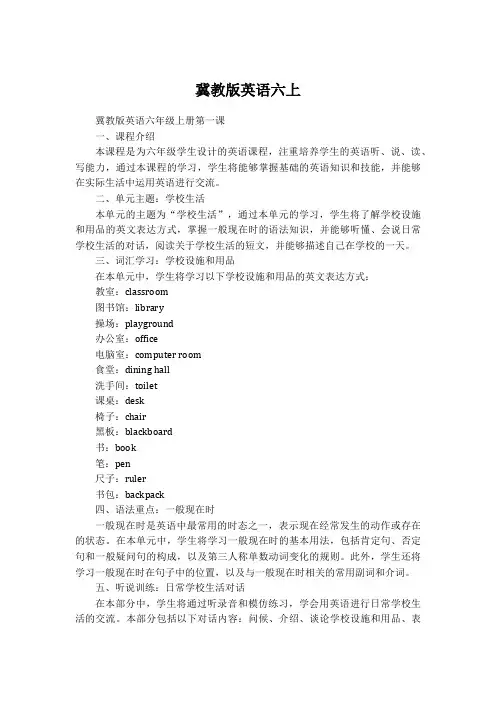
冀教版英语六上冀教版英语六年级上册第一课一、课程介绍本课程是为六年级学生设计的英语课程,注重培养学生的英语听、说、读、写能力,通过本课程的学习,学生将能够掌握基础的英语知识和技能,并能够在实际生活中运用英语进行交流。
二、单元主题:学校生活本单元的主题为“学校生活”,通过本单元的学习,学生将了解学校设施和用品的英文表达方式,掌握一般现在时的语法知识,并能够听懂、会说日常学校生活的对话,阅读关于学校生活的短文,并能够描述自己在学校的一天。
三、词汇学习:学校设施和用品在本单元中,学生将学习以下学校设施和用品的英文表达方式:教室:classroom图书馆:library操场:playground办公室:office电脑室:computer room食堂:dining hall洗手间:toilet课桌:desk椅子:chair黑板:blackboard书:book笔:pen尺子:ruler书包:backpack四、语法重点:一般现在时一般现在时是英语中最常用的时态之一,表示现在经常发生的动作或存在的状态。
在本单元中,学生将学习一般现在时的基本用法,包括肯定句、否定句和一般疑问句的构成,以及第三人称单数动词变化的规则。
此外,学生还将学习一般现在时在句子中的位置,以及与一般现在时相关的常用副词和介词。
五、听说训练:日常学校生活对话在本部分中,学生将通过听录音和模仿练习,学会用英语进行日常学校生活的交流。
本部分包括以下对话内容:问候、介绍、谈论学校设施和用品、表达时间和日期等。
学生将通过反复练习,掌握这些对话中的常用表达方式,提高自己的口语能力。
六、阅读理解:关于学校生活的短文本部分将提供一篇关于学校生活的短文,内容涉及学生在学校的学习和生活。
通过阅读这篇短文,学生将进一步巩固所学词汇和语法知识,提高自己的阅读理解能力。
在阅读过程中,学生需要理解文章的大意,完成相关的阅读理解题目。
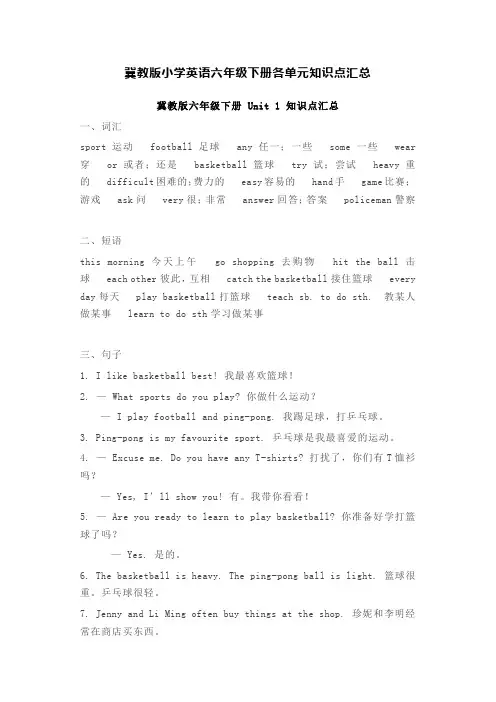
冀教版小学英语六年级下册各单元知识点汇总冀教版六年级下册 Unit 1 知识点汇总一、词汇sport运动football足球any任一;一些some一些wear 穿or或者;还是basketball篮球try试;尝试heavy重的difficult困难的;费力的easy容易的hand手game比赛;游戏ask问very很;非常answer回答;答案policeman警察二、短语this morning今天上午go shopping去购物hit the ball击球each other彼此,互相catch the basketball接住篮球every day每天play basketball打篮球teach sb. to do sth. 教某人做某事learn to do sth学习做某事三、句子1. I like basketball best! 我最喜欢篮球!2. — What sports do you play? 你做什么运动?— I play football and ping-pong. 我踢足球,打乒乓球。
3. Ping-pong is my favourite sport. 乒乓球是我最喜爱的运动。
4. — Excuse me. Do you have any T-shirts? 打扰了,你们有T恤衫吗?— Yes, I’ll show you! 有。
我带你看看!5. — Are you ready to learn to play basketball? 你准备好学打篮球了吗?— Yes. 是的。
6. The basketball is heavy. The ping-pong ball is light. 篮球很重。
乒乓球很轻。
7. Jenny and Li Ming often buy things at the shop. 珍妮和李明经常在商店买东西。
This morning, Jenny and Li Ming bought things at the shop. 今天早晨,珍妮和李明在商店买了东西。
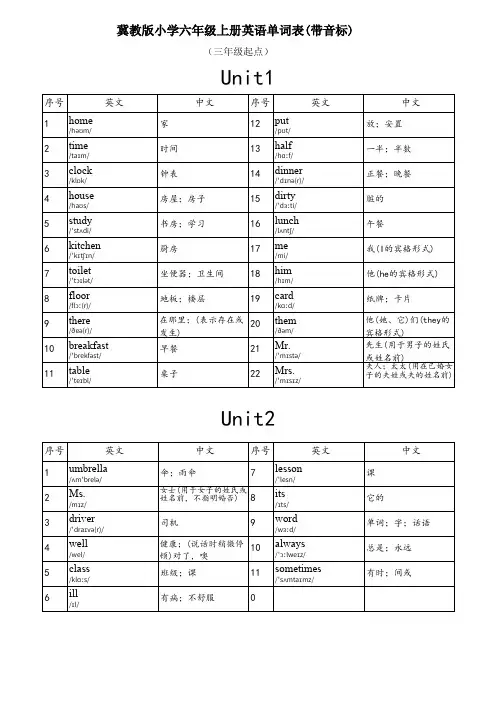
Unit1序号 英文 中文序号 英文 中文1home/həʊm/家12put/pʊt/放;安置2time/taɪm/时间13half/hɑːf/一半;半数3clock/klɒk/钟表14dinner/ˈdɪnə(r)/正餐;晚餐4house/haʊs/房屋;房子15dirty/ˈdɜːti/脏的5study/ˈstʌdi/书房;学习16lunch/lʌntʃ/午餐6kitchen/ˈkɪtʃɪn/厨房17me/mi/我(I的宾格形式)7toilet/ˈtɔɪlət/坐便器;卫生间18him/hɪm/他(he的宾格形式)8floor/flɔː(r)/地板;楼层19card/kɑːd/纸牌;卡片9there/ðeə(r)/在那里;(表示存在或发生)20them/ðəm/他(她、它)们(they的宾格形式)10breakfast/ˈbrekfəst/早餐21Mr./ˈmɪstə/先生(用于男子的姓氏或姓名前)11table/ˈteɪbl/桌子22Mrs./ˈmɪsɪz/夫人;太太(用在已婚女子的夫姓或夫的姓名前) Unit2序号 英文 中文序号 英文 中文1umbrella/ʌmˈbrelə/伞;雨伞7lesson/ˈlesn/课2Ms./mɪz/女士(用于女子的姓氏或姓名前,不指明婚否)8its/ɪts/它的3driver/ˈdraɪvə(r)/司机9word/wɜːd/单词;字;话语4well/wel/健康;(说话时稍微停顿)对了,噢10always/ˈɔːlweɪz/总是;永远5class/klɑːs/班级;课11sometimes/ˈsʌmtaɪmz/有时;间或6ill/ɪl/有病;不舒服0冀教版小学六年级上册英语单词表(带音标)(三年级起点)Unit3序号 英文 中文序号 英文 中文1season/ˈsiːzn/季节11mouth/maʊθ/嘴2spring/sprɪŋ/春天;春季12head/hed/头3summer/ˈsʌmə(r)/夏天;夏季13ear/ɪə(r)/耳朵4autumn/ˈɔːtəm/秋天;秋季14arm/ɑːm/胳膊5winter/ˈwɪntə(r)/冬天;冬季15leg/leɡ/腿6put on穿上;戴上16eye/aɪ/眼睛7take off脱下(衣服);摘掉17think/θɪŋk/认为;以为;想;思考8again/əˈɡen/再;又18can/kæn/能,会(过去式为could)9body/ˈbɒdi/身体19why/waɪ/为什么10nose/nəʊz/鼻子0Unit4序号 英文 中文序号 英文 中文1holiday/ˈhɒlədeɪ/假日;节日6then/ðen/然后;接着2bring/brɪŋ/带;带来(过去式为brought)7put up装饰;张贴3give/ɡɪv/给;给予8open/ˈəʊpən/打开4song/sɒŋ/歌曲9little/ˈlɪtl/幼小的;少许的5tomorrow/təˈmɒrəʊ/明天0。
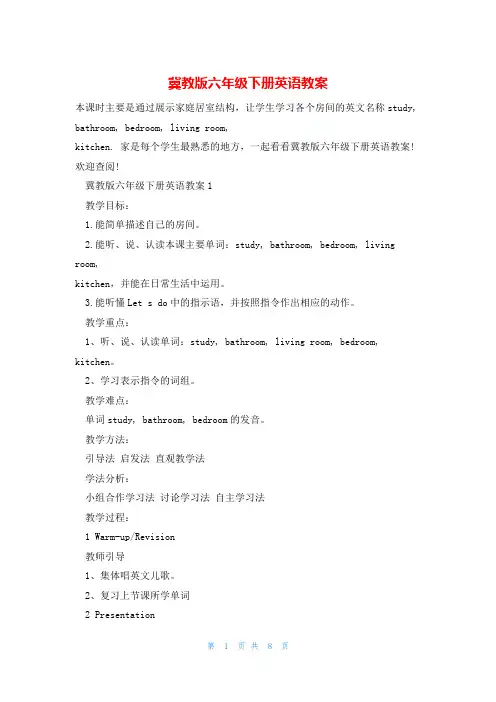
冀教版六年级下册英语教案本课时主要是通过展示家庭居室结构,让学生学习各个房间的英文名称study, bathroom, bedroom, living room,kitchen. 家是每个学生最熟悉的地方,一起看看冀教版六年级下册英语教案!欢迎查阅!冀教版六年级下册英语教案1教学目标:1.能简单描述自己的房间。
2.能听、说、认读本课主要单词:study, bathroom, bedroom, living room,kitchen,并能在日常生活中运用。
3.能听懂Let s do中的指示语,并按照指令作出相应的动作。
教学重点:1、听、说、认读单词:study, bathroom, living room, bedroom, kitchen。
2、学习表示指令的词组。
教学难点:单词study, bathroom, bedroom的发音。
教学方法:引导法启发法直观教学法学法分析:小组合作学习法讨论学习法自主学习法教学过程:1 Warm-up/Revision教师引导1、集体唱英文儿歌。
2、复习上节课所学单词2 Presentation1、出示study 的图片,手指着书房里的书问学生:What are they 教读单词 study, 并板书。
教师用动作帮助学生理解词义:We read the books in the study.2、按照相同方法,教授单词 bathroom, living room, bedroom.3、师把第46页Let’s learn部分的挂图贴到黑板上说:This is my home. How many rooms can you seeWhat are they4、教师说指令。
学生回答提问:They are books 并跟老师认读study。
学生依次回答问题并跟老师认读单词bathroom, living room, bedroom.学生用动作和语言表达句子,并说出相应的房间。
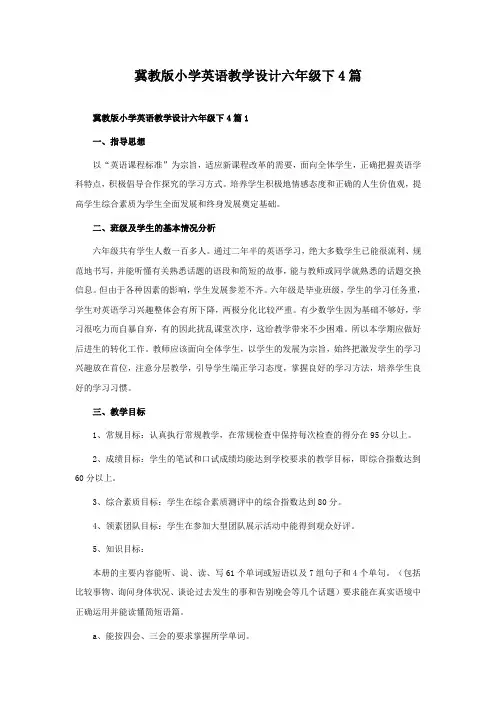
冀教版小学英语教学设计六年级下4篇冀教版小学英语教学设计六年级下4篇1一、指导思想以“英语课程标准”为宗旨,适应新课程改革的需要,面向全体学生,正确把握英语学科特点,积极倡导合作探究的学习方式。
培养学生积极地情感态度和正确的人生价值观,提高学生综合素质为学生全面发展和终身发展奠定基础。
二、班级及学生的基本情况分析六年级共有学生人数一百多人。
通过二年半的英语学习,绝大多数学生已能很流利、规范地书写,并能听懂有关熟悉话题的语段和简短的故事,能与教师或同学就熟悉的话题交换信息。
但由于各种因素的影响,学生发展参差不齐。
六年级是毕业班级,学生的学习任务重,学生对英语学习兴趣整体会有所下降,两极分化比较严重。
有少数学生因为基础不够好,学习很吃力而自暴自弃,有的因此扰乱课堂次序,这给教学带来不少困难。
所以本学期应做好后进生的转化工作。
教师应该面向全体学生,以学生的发展为宗旨,始终把激发学生的学习兴趣放在首位,注意分层教学,引导学生端正学习态度,掌握良好的学习方法,培养学生良好的学习习惯。
三、教学目标1、常规目标:认真执行常规教学,在常规检查中保持每次检查的得分在95分以上。
2、成绩目标:学生的笔试和口试成绩均能达到学校要求的教学目标,即综合指数达到60分以上。
3、综合素质目标:学生在综合素质测评中的综合指数达到80分。
4、领素团队目标:学生在参加大型团队展示活动中能得到观众好评。
5、知识目标:本册的主要内容能听、说、读、写61个单词或短语以及7组句子和4个单句。
(包括比较事物、询问身体状况、谈论过去发生的事和告别晚会等几个话题)要求能在真实语境中正确运用并能读懂简短语篇。
a、能按四会、三会的要求掌握所学单词。
b、能按四会要求掌握所学句型。
c、能使用日常交际用语,活用四会句型,进行简单的交流,做到大胆开口,发音正确。
d、能在图片、手势、情境等非语言提示的帮助下,听懂清晰的话语和录音。
四、措施:1.教学措施A、首先是利用学校电教资源,培养学生的学习兴趣,教师多方收集课件,利用白板教学,争取每一节课都能进行直观教学,结合生本教育,利用小组合作形式,让学生由简单化的听众转变为实践的积极参与者---活动的主体。
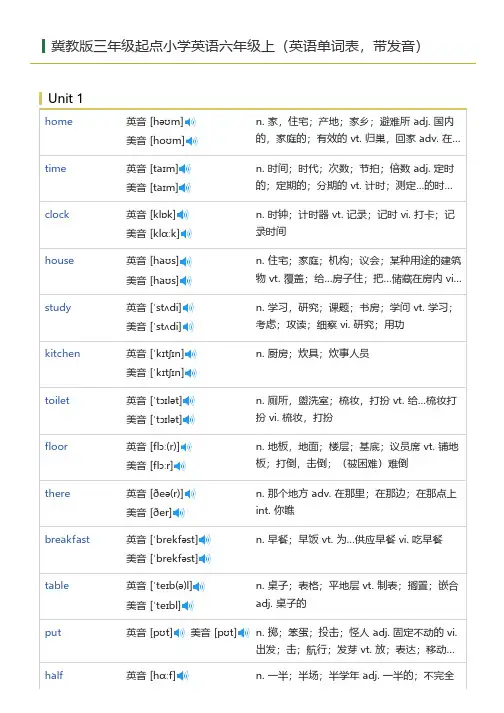
冀教版三年级起点小学英语六年级上(英语单词表,带发音)Unit 1home英音 [həʊm]美音 [hoʊm]n. 家,住宅;产地;家乡;避难所 adj. 国内的,家庭的;有效的 vt. 归巢,回家 adv. 在…time英音 [taɪm]美音 [taɪm]n. 时间;时代;次数;节拍;倍数 adj. 定时的;定期的;分期的 vt. 计时;测定…的时…clock英音 [klɒk]美音 [klɑːk]n. 时钟;计时器 vt. 记录;记时 vi. 打卡;记录时间house英音 [haʊs]美音 [haʊs]n. 住宅;家庭;机构;议会;某种用途的建筑物 vt. 覆盖;给…房子住;把…储藏在房内 vi…study英音 [ˈstʌdi]美音 [ˈstʌdi]n. 学习,研究;课题;书房;学问 vt. 学习;考虑;攻读;细察 vi. 研究;用功kitchen英音 [ˈkɪtʃɪn]美音 [ˈkɪtʃɪn]n. 厨房;炊具;炊事人员toilet英音 [ˈtɔɪlət]美音 [ˈtɔɪlət]n. 厕所,盥洗室;梳妆,打扮 vt. 给…梳妆打扮 vi. 梳妆,打扮floor英音 [flɔː(r)]美音 [flɔːr]n. 地板,地面;楼层;基底;议员席 vt. 铺地板;打倒,击倒;(被困难)难倒there英音 [ðeə(r)]美音 [ðer]n. 那个地方 adv. 在那里;在那边;在那点上int. 你瞧breakfast英音 [ˈbrekfəst]美音 [ˈbrekfəst]n. 早餐;早饭 vt. 为…供应早餐 vi. 吃早餐table英音 [ˈteɪb(ə)l]美音 [ˈteɪbl]n. 桌子;表格;平地层 vt. 制表;搁置;嵌合adj. 桌子的put英音 [pʊt]美音 [pʊt]n. 掷;笨蛋;投击;怪人 adj. 固定不动的 vi.出发;击;航行;发芽 vt. 放;表达;移动…half英音 [hɑːf]n. 一半;半场;半学年 adj. 一半的;不完全Unit 2美音 [hæf]的;半途的adv一半地;部分地dinner英音 [ˈdɪnə(r)]美音 [ˈdɪnər]n. 晚餐,晚宴;宴会;正餐dirty英音 [ˈdɜːti]美音 [ˈdɜːrti]adj. 下流的,卑鄙的;肮脏的;恶劣的;暗淡的 vt. 弄脏 vi. 变脏lunch英音 [lʌntʃ]美音 [lʌntʃ]n. 午餐 vt. 吃午餐;供给午餐 vi. 吃午餐;供给午餐me英音 [mi; miː]美音 [mi; miː]pron. 我(宾格) n. 自我;极端自私的人;自我的一部分I英音 [aɪ]美音 [aɪ]n. 碘元素;英语字母I pron. 我him英音 [hɪm; ɪm]美音 [hɪm; ɪm]pron. 他(宾格)he英音 [hi; iː; i; hiː]美音 [hi; iː; i; hiː]n. 男孩,男人;它(雄性动物) pron. 他card英音 [kɑːd]美音 [kɑːrd]n. 卡片;纸牌;明信片 vt. 记于卡片上them英音 [ðəm; ðem]美音 [ðəm; ðem]pron. 他们;它们;她们they英音 [ðeɪ]美音 [ðeɪ]pron. 他们;它们;她们Mr.英音 [ˈmɪstə(r)]美音 [ˈmɪstər]n. 先生Mrs.英音 [ˈmɪsɪz]美音 [ˈmɪsɪz]n. 先生umbrella英音 [ʌmˈbrelə]美音 [ʌmˈbrelə]n. 雨伞;保护伞;庇护;伞形结构Ms.英音 [mɪz; məz]女士Unit 3美音 [mɪz; məz]driver英音 [ˈdraɪvə(r)]美音 [ˈdraɪvər]n. 驾驶员;驱动程序;起子;传动器well 英音 [wel]美音 [wel]n. 井;源泉 adj. 良好的;健康的;适宜的adv. 很好地;充分地;满意地;适当地 v. 涌…class英音 [klɑːs]美音 [klæs]n. 阶级;班级;种类;班;等级 adj. 极好的;很好的,优秀的,出色的 vt. 分类;把……ill英音 [ɪl]美音 [ɪl]n. 疾病;不幸 adj. 生病的;坏的;邪恶的;不吉利的 adv. 不利地;恶劣地;几乎不lesson英音 [ˈlesn]美音 [ˈlesn]n. 教训;课 vt. 教训;上课its英音 [ɪts]美音 [ɪts]pron. 它的word英音 [wɜːd]美音 [wɜːrd]n. [语] 单词;话语;消息;诺言;命令 vt. 用言辞表达always英音 [ˈɔːlweɪz]美音 [ˈɔːlweɪz]adv. 永远,一直;总是;常常sometimes英音 [ˈsʌmtaɪmz]美音 [ˈsʌmtaɪmz]adv. 有时,间或season英音 [ˈsiːzn]美音 [ˈsiːzn]n. 时期;季节;赛季 vt. 给…调味;使适应 vi.变得成熟;变干燥spring英音 [sprɪŋ]美音 [sprɪŋ]n. 春天;弹簧;泉水;活力;跳跃 adj. 春天的 vt. 使跳起;使爆炸;突然提出;使弹开 v…summer英音 [ˈsʌmə(r)]美音 [ˈsʌmər]n. 夏季;全盛时期 adj. 夏季的 vi. 避暑;过夏天autumn英音 [ˈɔːtəm]美音 [ˈɔːtəm; ˈɑːtəm]n. 秋天;成熟期;渐衰期,凋落期 adj. 秋天的,秋季的winter英音 [ˈwɪntə(r)]n. 冬季;年岁;萧条期 adj. 冬天的;越冬的美音 [ˈwɪntər]vi. 过冬put on英音 [pʊt ɒn]美音 [pʊt ɑːn]na. 假话take off英音 [ˈteɪk ɒf]美音 [ˈteɪk ɔːf]v. (飞机)起飞;出去;拿掉;移送again英音 [əˈɡen]美音 [əˈɡen; əˈɡeɪn]adv. 又,此外;再一次;再说;增加 n.(英、保)阿盖恩body英音 [ˈbɒdi]美音 [ˈbɑːdi]n. 身体;主体;大量;团体;主要部分 vt. 赋以形体nose英音 [nəʊz]美音 [noʊz]n. 鼻子;嗅觉;突出的部分;探问 vt. 嗅;用鼻子触 vi. 小心探索着前进;探问mouth英音 [maʊθ]美音 [maʊθ]n. 口,嘴;河口 vt. 做作地说,装腔作势地说;喃喃地说出 vi. 装腔作势说话head 英音 [hed]美音 [hed]n. 头;头痛;上端;最前的部分;理解力 adj.头的;主要的;在顶端的 vt. 前进;用头顶…ear英音 [ɪə(r)]美音 [ɪr]n. 耳朵;穗;听觉;倾听 vi. (美俚)听见;抽穗arm英音 [ɑːm]美音 [ɑːrm]n. 手臂;武器;袖子;装备;部门 vt. 武装;备战 vi. 武装起来leg 英音 [leɡ]美音 [leɡ]n. 腿;支柱eye英音 [aɪ]美音 [aɪ]n. 眼睛;视力;眼光;见解,观点 vt. 注视,看think英音 [θɪŋk]美音 [θɪŋk]n. 想;想法 adj. 思想的 vi. 想;认为 vt. 想;认为;想起;想像;打算can英音 [kən; kæn]美音 [kən; kæn]aux. 能; 能够; 可以; 可能 n. 罐头; (用金属或塑料制作的)容器; (马口铁或其他…could英音 [kəd]美音 [kəd; kʊd]aux. 能够 v. 能(can的过去式)why int. 哎呀!什么? adv. 为什么Unit 4英音 [waɪ]美音 [waɪ]holiday英音 [ˈhɒlədeɪ]美音 [ˈhɑːlədeɪ]n. 假日;节日;休息日 vi. 外出度假bring英音 [brɪŋ]美音 [brɪŋ]vt. 带来;促使;引起;使某人处于某种情况或境地brought英音 [brɔːt]美音 [brɔːt]v. 带来(bring的过去分词)give英音 [ɡɪv]美音 [ɡɪv]n. 弹性;弯曲;伸展性 vi. 捐赠;面向;有弹性;气候转暖 vt. 给;产生;让步;举办;…song英音 [sɒŋ]美音 [sɔŋ]n. 歌曲;歌唱;诗歌;鸣声tomorrow英音 [təˈmɒrəʊ]美音 [təˈmɑːroʊ]n. 明天;未来 adv. 明天;未来地(等于to-morrow)then 英音 [ðen]美音 [ðen]conj. 然后,当时 n. 那时 adv. 然后;那么;于是;当时;此外put up提供;建造;举起;提高;推举,提名;供给…住宿;直接行动open英音 [ˈəʊpən]美音 [ˈoʊpən]adj. 公开的;敞开的;空旷的;坦率的;营业着的 vi. 开始;展现 vt. 公开;打开 n. 公开…little英音 [ˈlɪt(ə)l]美音 [ˈlɪtl]adj. 小的;很少的;短暂的;小巧可爱的 adv.完全不 n. 少许;没有多少;短时间。
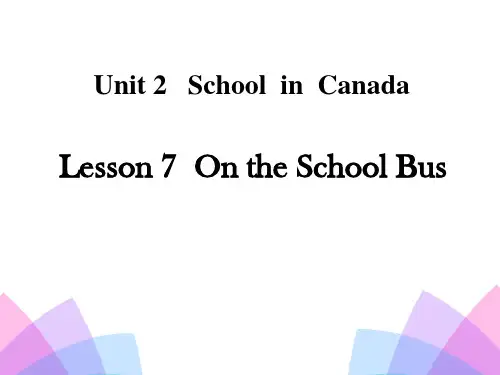
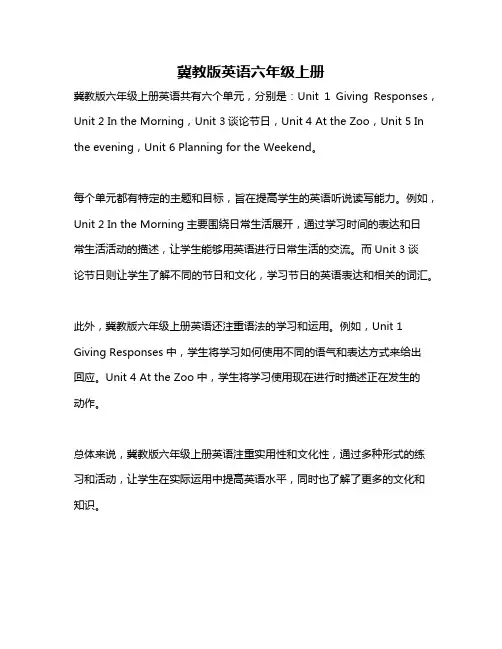
冀教版英语六年级上册
冀教版六年级上册英语共有六个单元,分别是:Unit 1 Giving Responses,Unit 2 In the Morning,Unit 3谈论节日,Unit 4 At the Zoo,Unit 5 In the evening,Unit 6 Planning for the Weekend。
每个单元都有特定的主题和目标,旨在提高学生的英语听说读写能力。
例如,Unit 2 In the Morning主要围绕日常生活展开,通过学习时间的表达和日
常生活活动的描述,让学生能够用英语进行日常生活的交流。
而Unit 3谈
论节日则让学生了解不同的节日和文化,学习节日的英语表达和相关的词汇。
此外,冀教版六年级上册英语还注重语法的学习和运用。
例如,Unit 1 Giving Responses中,学生将学习如何使用不同的语气和表达方式来给出
回应。
Unit 4 At the Zoo中,学生将学习使用现在进行时描述正在发生的
动作。
总体来说,冀教版六年级上册英语注重实用性和文化性,通过多种形式的练习和活动,让学生在实际运用中提高英语水平,同时也了解了更多的文化和知识。
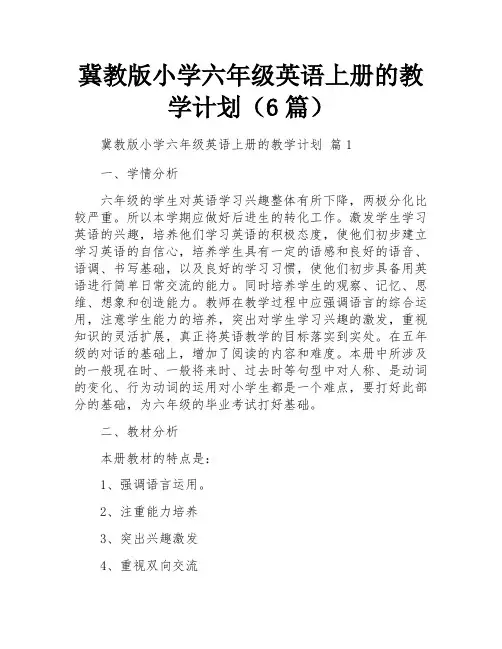
冀教版小学六年级英语上册的教学计划(6篇)冀教版小学六年级英语上册的教学计划篇1一、学情分析六年级的学生对英语学习兴趣整体有所下降,两极分化比较严重。
所以本学期应做好后进生的转化工作。
激发学生学习英语的兴趣,培养他们学习英语的积极态度,使他们初步建立学习英语的自信心,培养学生具有一定的语感和良好的语音、语调、书写基础,以及良好的学习习惯,使他们初步具备用英语进行简单日常交流的能力。
同时培养学生的观察、记忆、思维、想象和创造能力。
教师在教学过程中应强调语言的综合运用,注意学生能力的培养,突出对学生学习兴趣的激发,重视知识的灵活扩展,真正将英语教学的目标落实到实处。
在五年级的对话的基础上,增加了阅读的内容和难度。
本册中所涉及的一般现在时、一般将来时、过去时等句型中对人称、是动词的变化、行为动词的运用对小学生都是一个难点,要打好此部分的基础,为六年级的毕业考试打好基础。
二、教材分析本册教材的特点是:1、强调语言运用。
2、注重能力培养3、突出兴趣激发4、重视双向交流5、融合学科内容6、重视灵活扩展7、实现整体设计。
三、教学目标1、能听、说、读、写61个单词或短语以及7组句子和4个单句。
(包括长度、重量、高度、看病、情感、周末和假期活动、旅行、晚会等几个话题)。
要求能在真实语境中正确运用并能读懂简短语篇。
2、能完成1个手工制作。
3、能听懂、会唱6首歌曲。
4.能听懂并唱6首民谣。
5、能完成四次自我评价活动。
6、能理解6个幽默小故事。
7、能了解6项简单的中西方文化知识。
四、教材重难点、难点1、能按四会、三会的要求掌握所学单词。
2.能够按照第四次会议的要求掌握所学的句型。
3.能够使用日常交流语言,灵活运用四会句型,进行简单交流,语言大胆,发音正确。
4.借助图片、手势和情景等非语言提示,能够理解清晰的文字和录音。
难点:1、一般过去时、一般将来时等几个小学阶段所学句型中对人称、是动词的变化、行为动词的运用。
2.灵活运用四次会议所学的句型:对话、写作和阅读。
Unit 2 School in Canada Lesson 7 On the School Bus冀教版英语六年级上册Learning goals✔ 学生能听懂、会说、认读并书写下列词汇:umbrella, Ms., driver✔ 学生能认读、理解并运用下列句子:—Do you always go to school by bus?—Yes, I do. / No, I don't.Look and sayHow's the weather in this picture? It's rainy.What can you see in this picture?I see...What do they need?They need umbrellas.例句短语umbrella /ʌm'brel ə/n. 伞;雨伞an umbrella 一把雨伞These are not our umbrellas. 这些不是我们的伞。
New wordsDo you have your umbrella on a windy day?an umbrellathree umbrellasNo, I have my umbrella on a rainy day.driver/ ‘dra ɪv ə(r )/n . 司机bus driver 公共汽车司机My mother is a bus driver. 我妈妈是公共汽车司机。
例句短语New wordsdrive r +driver teach+erteacher动词+er 或r(如果 动词以e 结尾) 变成名词。
Ms./ miz /n . (名词)女士(用于女子的 姓氏或姓名前,不指明婚否)Ms. Scott 斯科特女士Ms. Scott is our school bus driver.斯科特女士是我们的校车司机。
例句短语New wordsWhere are Jenny and Li Ming? They are at the bus stop.What can you see at the bus stop? I can see...Who drives the bus? The bus driver.Look and answerWatch and answerWho is the bus driver?Ms. Scott.Does Jenny always have an umbrellaon a rainy day ?Yes, she does.Look and remember.seldom sometimesoften usually always从不,从未很少有时0%20%40%60%80%经常,常常通常,一般100%总是频率副词neverI drink milk on Monday.I drink soup on Wednesday.I often drink milk.I sometimes drink soup.频率副词放在主要动词之前。
Lesson 1 At the Airport一、教学目标(一)知识目标1.学生能听懂会读本课课文。
2.使学生通过练习复习句子:What time is it? It’s ____.复习所学过的时间表达法。
(二)能力目标1.学生能够模仿课文对话,能练习相互问候的日常用语。
2.培养以旧带新掌握一定的语言技巧的能力,练习该如何表达时间。
(三)情感目标以情感培养人,培养学生珍惜时间的好习惯。
二、教学重点掌握what time is it ? It’s_三、教学难点学生能够准确的用英语表达时间。
四、教学用具录音机,磁带五、教学资源2 : 10 two ten or ewo past ten.4 : 30 four thirty or half past four.9 : 00 nine o’clock or nine.5 : 45 five forty-five or a quarter to six.六、教学过程:Step 1 : Review1) Play a game: “ The number game” to review nu mber , play with numbers up to ten thousand .2) Review some phrases :What day is it ? What time is it ?Step 2 : Presentation and practice1.引出新课题,教授新单词airport,教读数遍并让学生明白单词的意思。
2.Ask and answer:1).Who is this?JennyDannyLi Ming.2).Where does Jenny live? Canada.Where does Li Ming live? China.3)How long is it from September 1 to June 25?Ss count the months:October November DecemberJanuary February…June.Wow!That’sten months.3.Teaching “ What time is it ? ”1) 指着自己的手腕处,T: What time is it ? (强调连读is it)S:“It’s ______”Explain that we use “o’clock” only on the hour.2) Demonstrate :T draws a clock on the blackboard.More the hands on the clock as T asks and answer the question . Then get volunteers to answer the question .Eg:2:40 two forty5:10 five ten6:37 six thirty seven9:00 nine o’clock3.Practice :1) Practice in pairs .2)Ask the volunteers to more the hands on the clock as they ask and answer the question .4.Teaching “ the text ”1)When the students listen to the tape , think over the question :a.Why does LiMing come to Canada (He wants to learn English)b.When does Li Ming arrive ?c.What time did Li Ming’s plane arrive ?d.Who meets him at the airport ?e.Did he have a good trip ?2)Read the dialogue and discuss the questions in groups .3)Ask the students to answer the questions .4)Read by themselves , then read role-play .Step 3.HomeworkMake up a dialogue about meeting someone at the airport . Use“ What time is it ? It’s .”七、BlackboardLesson 1 At the Airport5 o’c lock ——What time is it?6 o’clock——It’s5:25.Lesson2 Jenny’s House一、教学目标:(一)知识目标:1、能听、说、读、写单词:room; kitchen; bathroom; living room2、能用英语简单描述自己的家中的各个房间。
冀教版小学英语六年级(上册)单词表Unit 1:by (经,乘) foot(脚) bike(自行车) bus(公共汽车) train(火车) how(怎样) go to school (上学)traffic(交通)traffic light(交通灯)traffic rule(交通规则)stop(停,停车站)wait(等待)get to(到达)Unit 2:library(图书馆) post office(邮局) hospital(医院) cinema(电影院) bookstore(书店) where(在哪里,到哪里) please(请) next to(与…相邻) turn(转弯) right (右边) left(左边) straight(成直线地) then(然后)Unit 3:next week(下周) this morning(今天上午) this afternoon(今天下午)this evening (今天晚上) comic book(漫画书) post card(明信片) newspaper(报纸) buy(购买)Unit 4:hobby(爱好) ride a bike--riding a bike(骑自行车) dive--diving(跳水)play the violin—playing the violin(拉小提琴) make kites—making kites(制作风筝) collect stamps—collecting stamps(集邮) live –lives(居住) teach--teaches(教) go--goes(去) watch--watches(看) read--reads(读,看) does doesn’t=does notUnit 5:singer(歌唱家,歌手) writer(作家) actor(男演员) actress(女演员) artist(画家) TV reporter(电视台记者) engineer(工程师) accountant(会计) policeman(男警察) salesperson(销售员) cleaner(清洁工) where(在哪里,到哪里)work(工作)Unit 6:rain(雨) cloud (云) sun(太阳) stream(河,溪) come from(来自,从…来) seed(种子) soil(土壤) sprout (苗,芽) plant(植物,种植) should (应该) then(然后)冀教版小学英语六年级(下册)单词表Unit 1:tall—taller更高的short—shorter 更矮的strong—stronger更强壮的old—older 年龄更大的young—younger 更年轻的big—bigger更大的heavy—heavier 更重的long—longer 更长的thin—thinner 更瘦的small—smaller (体型)更小的Unit 2:have a fever 发烧have a sore throat喉咙疼have a cold感冒have a toothache 牙疼have a headache 头疼matter事情,麻烦sore 疼的hurt疼痛nose 鼻子tired疲劳的,累的excited兴奋的angry生气的happy高兴的bored无聊的,烦人的sad 忧伤的,悲伤的Unit 3:watch—watched 看wash—washed 洗clean—cleaned打扫play—played玩visit—visited 看望do—did last weekend上一个周末go—went去go to a park—went to a park 去公园go swimming—went swimming去游泳go fishing—went fishing去钓鱼read—read 读go hiking—went hiking 去郊游Unit 4:learn Chinese—learned Chinese学汉语sing and dance—sang and danced 唱歌和跳舞eat good food—ate good food吃好吃的食物take pictures—took pictures 照相climb—climbed 爬have—had buy presents—bought presents买礼物row a boat—rowed a boat 划船see elephant—saw elephant 看大象go skiing—went skiing 去滑雪go ice-skating—went ice-skating 去滑冰how怎么,如何get—got 到达last上一个的,仅余的,留在最后的。